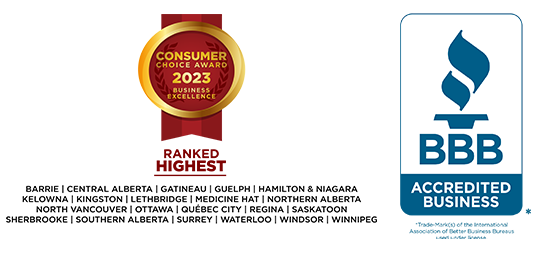What is my credit profile?
Reaching out to your financial institution to finance a purchase can be a nerve-wracking experience. Be it a house, car, vacation, recreational equipment, or anything else for that matter, being unsure about whether the loan application will be approved can be a significant stressor that feels out of your control.
Knowing your credit profile before you meet with your financial provider can do a lot to help you address any risks or gaps you may want to attend to, and increase your chances of success in the application process.

What is my credit profile?
In short, your credit profile is your financial reputation and used to gauge your credit worthiness. Each time you borrow, and how you respond to payment obligations helps you build your credit history and credibility. When you apply for additional credit, financial lenders will take into consideration your credit profile, as well as information regarding your employment, life circumstances, and additional debts.
What is credit worthiness?
Creditworthiness is a lender's belief that an individual will pay their debts and helps determine a lender’s willingness to lend to that individual. A borrower is deemed creditworthy if a lender considers them to be willing, able and responsible enough to make loan payments as agreed until a loan is fully repaid.
Banks and other financial institutions utilize a number of tools to assess an individual’s credit application and making lending decisions based on credit worthiness.
Credit rating
One of the most important tools lenders will look to is your credit history and rating. As a consumer, your credit rating is a number based on information from your credit reports with two major reporting bureaus — Equifax and TransUnion. Your credit rating is designed to give lenders and creditors your likelihood of fulfilling your financial commitments and repayments based on your previous dealings with debt.
Scores range from 300-900. The higher your credit score, the less risk the financial institution identifies, and the greater the likelihood an individual will pay back a loan, making the case for an approved application. Additionally, a high credit score, will often result in a lower interest rate from a lender.
Typically, a score over 650 means an individual can qualify for a standard loan from a traditional lending institution. A score under 650 could cause difficulty in being approved for new credit and could lead to having to deal with lenders that charge extremely high, often even predatory interest rates in order to obtain a loan.
It is important for you to regularly review your credit history and be aware of your credit score. If past mistakes have led to a poor credit history and a low credit rating, now is the time to take the necessary steps to address any lingering debt, improve your credit history and boost your credit score.
Credit history
Your credit history is a track record of how you manage credit and payments over time and is based on information provided by lenders that have previously extended credit to you.
A credit history consists of various pieces of information such as:
- How many accounts you’ve had – open and closed? If you are new to credit and don’t have much by way of a history, a financial services provider may be hesitant to lend you money. Conversely, if you have been frequently applying for new credit, this can signal potential financial difficulty and can be a red flag for the lender.
- Are the accounts revolving or installment credit? An example of revolving credit would be credit cards, while an example of installment credit would be a car loan.
- How much is owing on each account? Are your credit cards or lines of credit consistently maxed out? Do you consistently carry a balance on your credit cards? Do you have numerous credit cards, all of them carrying a balance? These are all situations that cause concern to financial institutions and can lead to refusal of a loan application.
- What is your payment history? Have you paid your bills on time or are there numerous missed payments/delinquencies and accounts in collection? Paying your bills on time, all the time, is critical as this consistency, built up over time, helps improve both your credit history and your credit score.
Checking your credit report
Credit reporting agencies must provide a free copy of your credit report, which includes your credit rating, upon request. Check it periodically to ensure all information and records are accurate and up to date. You can contact Equifax online and directly at 1-800-465-7166 or TransUnion at 1-800-663-9980.
Report any erroneous information to the reporting agency immediately. Legally, they must respond to any concerns you raise. If you are not satisfied with how they handle your file, you may also file a complaint with the provincial ministry responsible for consumer matters.
Capacity to pay
A financial lender is going to want to factor in whether you can actually repay the debt for which you are applying. The lender will consider your current income and monthly living expenses. They will also factor in any other debt repayment you are currently making to determine if you can comfortably afford to pay back the loan. Employment history is also an important factor in the decision-making process. If you have been with your current employer less than three months, many lenders will be hesitant to grant you credit. There is too much risk that the job may not be a or permanent position. Having remained with an employer for a long period of time often provides financial institutions with a sense of comfort in that your economic position is stable, and you are more likely to be able to successfully repay your debts.
Existing debt
A financial lender will also look at how much debt you currently have. If you have numerous credit cards and regularly carry a large balance on the cards, that can be a red flag for the bank. Similarly, a situation where you are carrying what the lender perceives to be too many loans, whether they be for a mortgage, car, RV, or consolidation loan, can impact the lender’s willingness to lend to you.
While having a loan and regularly making the payments is beneficial for your credit rating and can help bolster said rating, having too many payments will affect your debt-to-income ratio and impact your credit worthiness.
What is a debt-to-income ration?
Debt-to-income ratio (DTI) is expressed as a percentage and represents the portion of your gross monthly income that goes to servicing your monthly debt. This percentage can predict your ability to make payments on both your existing and new debt. A DTI of less than 36% is ideal, but the lender may consider lending to an individual with a higher DTI if other factors are favourable.
Collateral
This refers to assets that you may own that you can pledge to the lender as security to ensure you will repay the loan. The perfect example is a car or house. When you finance either, the lender will register a security interest against your asset to ensure that if you fail to make the agreed upon payments, the lender can seize and sell the asset to recover their loss.
Having sufficient collateral can greatly increase your odds of being approved for a loan and can also lead to lower interest rates.
Savings can be considered another form of collateral. Do you have savings accounts or investments with a meaningful balance in them? Do you regularly contribute to your savings account and do you leave the money on deposit in those accounts?
Regularly contributing to a savings account and building up the value of that account can reassure lenders that even if your income is compromised, you have a back up that you can continue to make the loan payments. Regularly contributing to a savings program or plan also tells your lender you are not only responsible to your financial obligations but have the discipline to put money away on your own accord.
Securing debt often involves a lot of scrutiny and can feel overwhelming. Understanding what lenders are looking for, checking your credit score and report, and looking for ways to put your best foot forward can help you breathe easier throughout the process.
If you’re struggling with debt-consolidation options or availability
If you’re struggling with overwhelming debt and worry it’s affecting your credit report and score, reach out to a Licensed Insolvency Trustee for a Free Confidential Consultation today.
Together, you will review your financial history, discuss your challenges and goals and identify opportunities for you to achieve a permanent financial fresh start. You may qualify for a Life-Changing Debt Solution, such as a Consumer Proposal or Bankruptcy. Or you may benefit from strategies and referrals that will help you defeat your debt for good.
No matter which direction you choose, your Licensed Insolvency Trustee will help you make the best decision for your unique situation — putting you on the path to financial wellness and ensuring your current roadblocks won’t get in the way of future opportunities.

